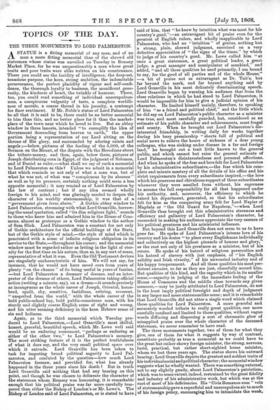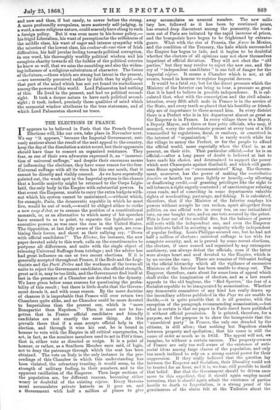TOPICS OF THE DAY.
THE THREE MONUMENTS TO LORD P ALMERSTON.
ASTATUE is a fitting memorial of any man, and of no man a more fitting memorial than of the shrewd old statesman whose statue was unveiled on Tuesday in Romsey Market Place, for he was unquestionably a man whose great traits and poor traits were alike written on his countenance. There you could see the lucidity of intelligence, the deep-set, tenacious purpose, the keen, strong ambition, the indomitable perseverance, the perfect placidity of vigour and self-confi- dence, the thorough loyalty to business, the munificent gene- rosity, the kindness of heart, the twinkle of humour. There, too, you could read something of individual unscrupulous- ness, a conspicuous vulgarity of taste, a complete worldli- ness of morale, a coarse thread in his jocosity, a contempt for finer sentiment. If Mr. Noble's statue of Lord Palmerston be all that it is said to be, there could be no better memorial to him than this, and no better place for it than the market- place of the town near which he loved to live. But an abbey window in three lancets, intended "to exemplify the idea of Government descending from heaven to earth," the upper portion being a representation of our Lord sitting on the throne of His glory, and surrounded by adoring saints and angels ;—below, pictures of the feeding of the 5,000, of the Sermon on the Mount, of the dispute with the Herodians about the tribute-money, and then, again, below these, pictures of Joseph distributing corn in Egypt, of the judgment of Solomon, and of Daniel as ruler,—what shall we say of such a memorial to Lord Palmerston as this I Unless we admit in a memorial that which reminds us not only of what a man was, but of what he was not, of what was " conspicuous by its absence " as well as by its presence, certainly nothing could seem a less apposite memorial ; it may remind us of Lord Palmerston by the law of contrast ; but if any idea seemed wholly foreign to his mind, and was glaringly needed to deepen the character of his worldly statesmanship, it was that of a "government given from above." A Gothic abbey window to Lord Palmerston, streaming with what Lord Granville, borrow- ing the usual quotation, called "its dim religious light," sounds to those who knew him and admired him in the House of Com- mons, almost as grotesque as a Gothic window to the author of Sam Slick. Lord Palmerston was a constant foe not only of Gothic architecture for the official buildings of the State, but of the Gothic style of mind,—the style of mind which is penetrated with a sense of infinite religions obligation in its service to the State,—throughout his career; and the memorial window must be regarded rather as letting in the light of eter- nity for the first time on his nature, than as, in any sort of sense, representative of what it was. Even the Old Testament devices are singularly uncharacteristic of him. We will not say, for instance, that he would not have saved corn from years of plenty "on the chance " of its being useful in years of famine, —but Lord Palmerston a dreamer of dreams, and an inter- preter of the dreams of others, Lord Palmerston taking official action (writing a minute, say), on a dream—it sounds precisely as incongruous as the whole career of Joseph, Oriental, home- bred, spoilt, shy, sensitive, fastidious, retiring, reverent, " unspotted from the world," with the whole career of the bold public-school boy, bold public-conscience man, with his sturdy and slightly coarse English sense of right and wrong, and his utter seeming deficiency in the keen Hebrew sense of sin and holiness.
Again, as to the third memorial which Tuesday pro- duced to Lord Palmerston,—Lord Granville's most skilful, honest, graceful, beautiful speech, which Mr. Lowe well said would be an enduring monument, "perhaps as enduring as either of the other two," to Lord Palmerston's memory. The most striking feature of it is the perfect truthfulness of what it does say, and the very small political space over which it extends. Lord Granville has been taken to task for imputing broad political sagacity to Lord Pal- merston, and confuted by the question—how much Lord Palmerston foresaw, and provided for, what has already happened in the three years since his death f But in truth Lord Granville said nothing that had any bearing on this point, and though he was chosen to delineate the character of the statesman whom Romsey was honouring, it is remarkable enough that his political praise was far more carefully tem- pered than either the Bishop of London's or Mr. Lowe's. The Bishop of London said of Lord Palmerston, or is stated to have said of him, that " he knew by intuition what was most for his country's good,"—an extravagant bit of praise even for the greatest of English rulers, and wholly inapplicable to Lord Palmerston, who had no " intuition " of genius, nothing but a strong, plain, shrewd judgment, exercised on a very- defective appreciation of " the signs of the times," by which to judge of his country's good. Mr. Lowe called him " at once a great statesman, a great political leader, a great judge, a great manager and manipulator of mankind," and added, "and all these qualities he used primarily, I am bound to say, for the good of all parties and of the whole House," —a bit of praise not as extravagant as Dr. Tait's, but far beyond the mark, and far beyond anything said by Lord Granville in his most delicately discriminating speech.
Lord Granville began by warning his audience that from the close relations in which he had stood to Lord Palmerston, it would be impossible for him to give a judicial opinion of his character. He limited himself mainly, therefore, to speaking of him "as a friend and political chief," and the little which he did say on Lord Palmerston's public character as a minister was true, and most carefully guarded, but, considered as an estimate of his public character and achievements, most frugal and scanty. When he brought out Lord Palmerston's dis- interested friendship, in writing daily for weeks together during his busy premiership " sheets full of political and social news to relieve the hours of sickness of a dear young colleague, who was sinking under disease in a far and foreign land," he brought out a trait little known to the general public, and which cannot but raise the general estimate of Lord Palmerston's disinterestedness and personal affections. And when he spoke of the fear and love felt for Lord Palmerston by his administrative subordinates,—the fear which his com- plete and minute mastery of all the details of his office and his strict requirements from every subordinate inspired,—the love which his generous and chivalrous support of these subordinates whenever they were assailed from without, his eagerness to assume the full responsibility for all that happened under his authority, and, moreover, the efficiency to which he raised his department, generated, so that his subordinates felt for him as the conquering army felt for Lord Napier of Magdala or " the Old Guard for Napoleon,"—when Lord Granville thus brought out this administrative sternness and efficiency and gallantry of Lord Palmerston's character, he succeeded in making his audience appreciate the very essence of his political greatness and his ministerial influence.
But beyond this Lord Granville does not seem to us to have gone far. He spoke of Lord Palmerston's intense love of his country and his desire " to place every Englishman individually and collectively on the highest pinnacle of honour and glory," as the root not only of his greatness as a minister, but of his errors. He spoke of his hatred of religious persecution and his hatred of slavery with just emphasis, of "his English solidity and Irish vivacity," of his unwearied industry and of his happy temperament. And all these qualities his most per- sistent enemies, so far as they are just, cheerfully accord him. But qualities of this kind, and the sagacity which in its smaller sense,—sagacity in judging of the immediate feeling of the House of Commons and the middle class towards any given measure,—may be justly attributed to Lord Palmerston, do not in the least imply political foresight and depth of judgment in any larger and more statesmanlike sense; and it is remarkable that Lord Granville did not utter a single word which claimed these qualities for Lord Palmerston. A more graceful and accurately worded tribute to really great qualities, one more carefully confined and limited to those qualities, without vague words diffusing and dispersing a sort of chromatic glow of misapplied praise over the whole character of the deceased statesman, we never remember to have read.
The three monuments together, two of them for what they give, one of them for what it suggests by way of contrast, constitute probably as true a memorial as we could have to the great but rather showy foreign minister, the strong, nervous, lucid, practical, but rather short-sighted home minister, whom we lost three years ago. The statue shows his outward bearing; Lord Granville depicts the greatest and noblest traits of his individual social and political character; the memorial window suggests what he wholly wanted. There was something external, not to say slightly gaudy, about Lord Palmerston's patriotism, which was to some extent. indeed, restrained by the great fidelity and industry of his administrative work, but which was at the root of most of his deficiencies. His "Civic Romanus sum " vein of statesmanship gave a superficial and unscrupulous air to much of his foreign policy, encouraging him to intimidate the weak, and now and then, if but rarely, to cower before the strong. A more profoundly scrupulous, more austerely sell-judging, in a word, a more religious nature, could scarcelyhave clung to such a foreign policy. But it was even more in his home policy,— his frigid Liberalism, his want of perception for the selfishness of the middle class, his want of eager and intense sympathy with the miseries of the lowest class, his couleur-de-rose view of Irish difficulties, his half jocular feeling towards political corruption, in one word, his thoroughly worldly political wisdom and his complete charity towards all the foibles of the political coteries he knew so well, that we miss the ennobling and also the widen- ing influence of a religious substratum of character. The forces of the future,—those which are strong but latent in the present, —are necessarily perceived rather by faith than by sight,—by that part of the mind which has not yet found its embodiment among the powers of this world. Lord Palmerston had nothing of this. He lived in the present, and had no political second- sight. It took a deeper nature to have such political second- sight ; it took, indeed, precisely those qualities of mind which the memorial window attributes to the true statesman, and of which Lord Palmerston showed no trace.































 Previous page
Previous page